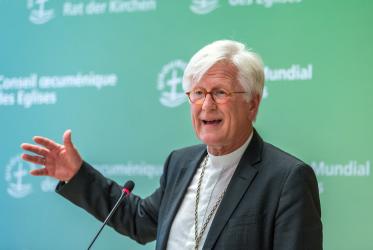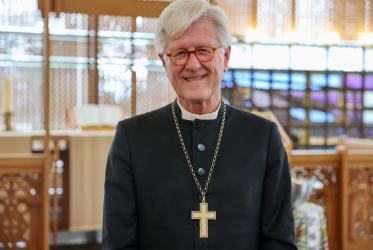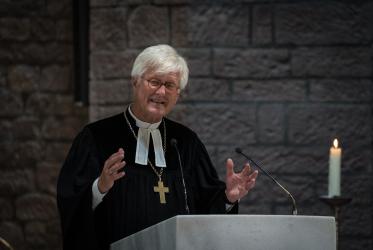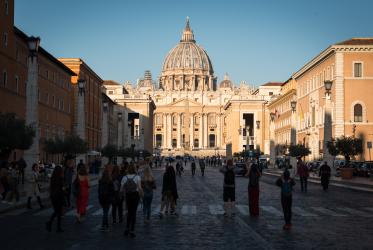Dear sisters and brothers,
We have come together today for a very special occasion. It is the first meeting of the newly elected executive committee of the WCC. We have come together from all parts of the world in a situation of great challenges and, therefore, great concern and worry. The terrible war in the Ukraine is going on and no end is visible. Especially in some European countries, there is fear of a cold winter with a lack of energy supply. Inflation has led to strongly increased challenges for those globally who had struggled to make enough living even before.
“Christ’s love moves the world to reconciliation and unity.” What the motto of our Karlsruhe assembly says, is not a visible empirical truth. But as Christians we say: it is not yet an empirical truth. We trust that God’s ways for us will not lead into darkness but into a new heaven and a new earth. Our Lord Jesus Christ cried out at the cross: “My God, my God, why have you forsaken me!?” Just as the Ukrainians whose homes are destroyed by Russian bombs are crying out today. Just as Russian mothers who receive the dead bodies of their sons killed in this war cry out as well. And just as the mother in Northern Kenya who looks at her child dying of thirst cries out.
Why have we nevertheless dared to again and again repeat this sentence: “Christ’s love moves the world to reconciliation and unity”? The answer is clear: We have repeated it and we are repeating it today, because we deeply believe that the realities of suffering that we have in front of our eyes are not God’s last word - just as Jesus’ cry of despair was not God’s last word. Christ has risen. This is what we deeply believe in our hearts and souls.
We have experienced in Karlsruhe that this confession is not only empty words. In our prayer services we have felt how the Holy Spirit has brought us together as people with completely different backgrounds and yet united as brothers and sisters in Christ. In our discussions in the plenaries, committees and ecumenical conversations we sometimes had to struggle to stay together or even to come together in the first place. The power of unity, however, was stronger than the forces of division.
Let me say it very personally: When I – then as the chairman of the Council of the EKD - presented our application for Karlsruhe as the place for the next assembly, I said that we need you as the churches of the world to inspire us in Europe with your spiritual power. This is what actually happened to a degree that I could have hardly hoped for. I will never forget the prayer services of this assembly. There were many times, when I was moved to tears by the spirit of God and the community that came from it. The harmony of the different voices of the songs, the bodies that moved to the rhythm of the music and the words that were spoken along with it gave me many moments of wholeness, of deep happiness, of an open heaven. Sometimes I still hum these songs in my daily work and it gives me strength and joy. Many of my fellow hosts in Karlsruhe describe similar experiences. So I say “thank you” to all of you for giving us the honor to be our guests and inspire us with your joy of faith!
This experience in Karlsruhe gives us a big push in our work in the executive committee that begins today. This first meeting will give us the opportunity to get to know each other better. We will have to deal with numerous challenging topics such as the sustainability of our budget and the future programmatic work. The basis for finding good solutions for all these challenging questions is experience, competence, theological knowledge, firmness in faith, but in all that, and maybe even above all, relationship - relationship to each other based on relationship in Christ. That is the basis for the “ecumenism of the heart”, of which the Karlsruhe message speaks.
If we look at the biblical stories on Jesus and his words and deeds, we see that Jesus never put the correctness of theological teachings or the abidance to given rules above relationship. “The Sabbath was created for humans; humans weren’t created for the Sabbath” (Mark 2,27). Let us be together in this spirit. Let us be grateful for all the denominational traditions that we come from. But let us always be aware that these denominational traditions are never an end in themselves but serve as a door to Christ himself. And if we are in relationship with Christ, in prayer, in reflection and in action, we will always be in relationship with our fellow human beings and, in a special way, with our sisters and brothers in Christ all over the world. That is why it is intolerable if those who call themselves sisters and brothers in Christ put each other down, spread hate against each other or even kill each other in war or through other forms of violence.
Through this, we betray Jesus’ call to be salt of the earth and light of the world. And we destroy all efforts to go and make disciples of all nations, baptizing them in the name of the Father and of the Son and of the Holy Spirit, and teaching them to obey everything Jesus has commanded us (Mt 28,19f). We can only live the mission of God when we do not only speak of the love of Jesus Christ but also radiate it with our own lives.
When Paul deplores the divisions in the Corinthian congregation in 1 Cor 1, he asks a question: “Has Christ been divided?” I want us as executive committee just as much as the central committee of the WCC to give a clear answer. No! Christ has not been divided! Therefore, we as Christ’s followers will never accept the divisions amongst ourselves. We will give a witness of unity to the world and thereby help the world to move toward more unity!
This is the calling of WCC. Therefore, I want to use this opportunity to express my deep gratitude to our acting general secretary Father Ioan Sauca for his tireless efforts to give witness to this calling. Even in the short time since the Karlsruhe Assembly he has worked hard in this respect. He went to South Korea to address a big Pentecostal meeting. And he visited Russia and had talks with Patriarch Kirill in Moscow, bringing back encouraging signs of steps for more consensus. Dear brother general secretary, from the bottom of my heart: thank you for your impressive commitment and your strong witness! It has been a great blessing for all of us!
We will discuss possible ways to move towards witnessing unity and reconciliation in the coming days by following the programmatic guidelines that the Karlsruhe assembly has given us. What will our pilgrimage of justice, reconciliation and unity mean for our efforts to fundamentally transform the global economy from destruction of natural environments to ecological sustainability? What can we do to encourage our governments to support a path that will allow us to limit global warming to a tolerable level? As we convene here, government officials from all over the world have come together in Sharm el-Sheikh, Egypt, for COP27 and will have to make concrete decisions in that respect. We urge them to be aware of their responsibility to overcome the sin of destroying nature that we see as creation of God entrusted to us so we care for it.
What will the pilgrimage of justice, reconciliation and unity mean for our efforts to stop the killing in the Ukraine? If we as a community of brothers and sisters from different sides of the war cannot be helpful in this, who else can be? Because of the urgency of this question, the last central committee has clearly denounced the Russian aggression as an illegal and immoral war. After a long debate in the central committee in June 2022, it was decided not to suspend the Russian Orthodox Church but to challenge the church, using the WCC as a space for dialogue. All the mutual exchanges in Karlsruhe have shown how wise this decision was. I am very glad that we have our Russian brothers and sisters represented among us also today. Let us use this opportunity for exchange in this precious community and give the Holy Spirit a chance to move us, and maybe through us, move the world towards a just peace.
Let me also mention the continuing tensions on the Korean peninsula. We should do whatever we can to prevent wars by continuously building bridges and follow ways for peace before tensions escalate. Therefore, as a part of our pilgrimage of justice, reconciliation and unity we accompany and support the churches and people of Korea in their continuing search for peace, reunification and reconciliation.
Brothers and sisters,
Let us celebrate how precious it is to be together here in Bossey as delegates from churches all over the world. Let me say very personally how precious it is for myself. I have just returned from a week visiting the Lutheran Church of Tanzania. Coming myself from a church struggling with increasing erosion of traditional church affinities, this was a spiritual feast for me. Five worship services in one morning among the Massai near Arusha in Northern Tanzania with chanting and dancing, and a conference with 300 Tanzania women pastors and a spiritual joy, which still resonates in my heart made me say to them: You are now missionaries of joy for us in the European countries.
This experience in Tanzania stands for many other experiences I have had in the global ecumenical community. Therefore, I greatly look forward to my task as moderator in the coming eight years. Beyond all challenges and with full awareness of all the difficulty of the task I very much look forward to the spiritual nurturing that the fellowship in this ecumenical community means for me. It is a source of hope for me. It might be stubborn hope, sometimes even a desperate hope. But it lives from the deep conviction that God’s commitment after the flood, expressed in the rainbow, to never destroy the earth anymore and keep the eternal covenant of peace is firm and certain. It will prevail!
Let us be together in this spirit in these coming days of serious discussion and reflection but also of spiritual nurture, of love and of joy.





